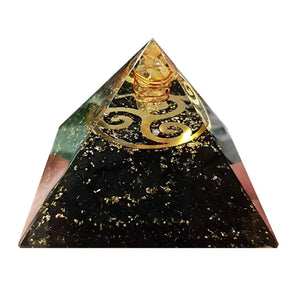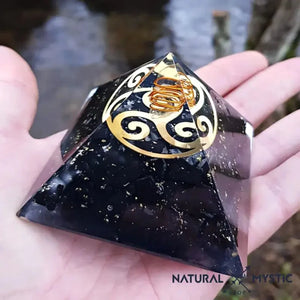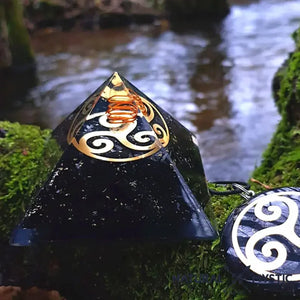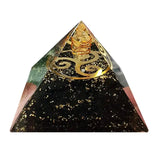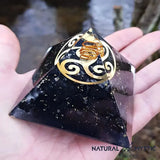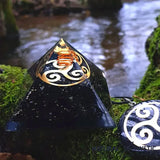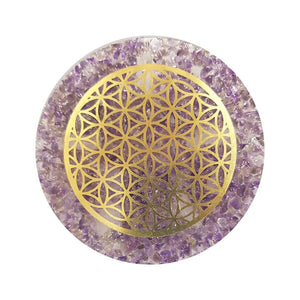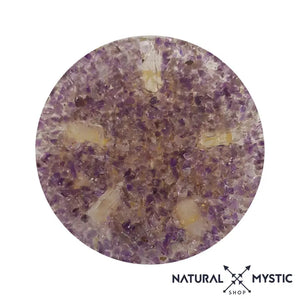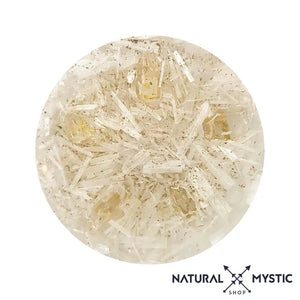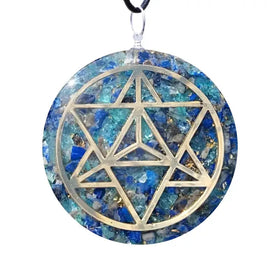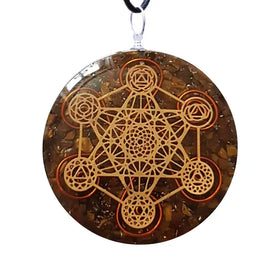In recent decades, ancient healing practices from around the world have become increasingly popular in Western society: shamanism, yoga, Ayurveda, acupuncture... . But for many, shamanism is an abstract concept shrouded in mystery, despite widespread recognition of its effectiveness and usefulness.
The name is formed from the verb ša, which means "to know", so the term " shaman " literally translates to "one who knows".
Shaman, Shaman, Shaman
WHAT IS SHAMANISM?
The first shamanic practices date back to the Paleolithic, and developed strongly in the Mesolithic, to give rise to different shamanic lineages. The best known today are South American shamanism (or Native American, from which the Ayahuasca ritual comes), Mongolian, Korean, Chinese, Tibetan, Turkish shamanism for the oldest, and closer to us, Corsican shamanism. or even Hyperboreans (Celtic).
"Shaman is an ancient term for a healer, a person of medicine. Shamans understand that the material world is an expression of a more subtle energetic realm, and are able to interact with both realms at any time. They have taught to dream their world in this energetic realm, so that they can participate in the creation and stewardship of reality." Alberto Villoldo
What is the role of a shaman?
In ancient times, healers were called shamans. They worked with the spirit, healing illnesses at the soul level. They collected ideas and gained knowledge by working with nature spirits. Through dances, rituals, shamanic trances induced by rituals and initiatory processes, shamans communicated with the invisible.What religion is shamanism associated with? Shamanism is not associated with any particular religion nor is it a religion in itself. Instead, shamans around the world belong to different organized religions and view shamanism more as a spiritual practice .
Where is shamanism practiced today?
How is shamanism practiced? communicate with a spirit's consciousness , the shaman attempts to transfer his own state of consciousness. They may use different approaches, such as repetitive sounds (rhythmic drumming) and meditation. He can use stones (ludolite, shaman's stone), bones, artifacts, wear or not a traditional costume to join the world of spirits (ancestors, nature, animals).
VIDEO
Shamanism itself is not tied to a place or culture, but experts say the term " shaman " originated with the Tungus tribe in Siberia.
Although there are spiritual and mystical connotations to the term, the term " shaman " itself is in no way linked to any specific religion or belief.An Encyclopedia of Shamanism ", describes the shaman as a person who has mastered three specific areas: altered states of consciousness , intervening as a medium between the needs of the spirit world and those of the physical world, in a way that is useful to the community.
A shaman has the ability to meet the needs of the community in a way that other practitioners, such as doctors, psychiatrists, and religious leaders, cannot.
In some cultures, this may mean that a shaman dispenses wisdom or leads ceremonies in areas such as meditation and energy work, but again, the specifics of the practices vary by culture.
A variety of formal religions are said to have roots in ancient shamanic traditions , but specific practices and beliefs vary. The purpose of shamanism is to support your health and well-being, within groups of shared activities and experiences, led by shamans in cultures around the world.Shamans intervene in the minds and souls of those who ask for their help. They cure illness at the soul level. Shamans develop knowledge and insight by communing with nature spirits such as rivers, rocks and trees, the earth, and they gain rare knowledge. They work with the spirits of animals and humans such as their ancestors. For the shaman, everything is alive and carries information. You can call this mind, energy or consciousness .state of consciousness . Shamans can do this through various means, such as meditation, repetitive sounds such as that of a drum or rattle, or using hallucinogenic plants, the shaman will then "see" through a new pair of eyes, he will see what is happening with you on a spiritual level.The shaman also practices soul theft . The change in consciousness that the shaman operates, which allows the free part of his soul to leave the body. The shaman seeks information and clues that can help heal you, care for you and program your development and growth. They can recover healing power or things that you have lost along the way in living your life. During the flight of the soul , the shaman is both here and elsewhere, he is in the room and he is performing a shamanic journey, in the spirit world at the same time, he is aware of both at the same time.
THE WORLD OF THE SHAMAN
Understanding the world of shamanism is much more complex than one might think, it is a lofty and worthwhile goal. Shamanism is based on experience and direct experience of the transpersonal world. This world is completely real to the shaman, like the tangible material reality of the world we know, like family and professional relationships.anthropological studies which are truly irreplaceable references in the study of shamanism or, rather, shamanisms. To name just a few, the authors: the Incas, Garcilaso de la Vega, Mircea Eliade, Lévi-Strauss, Joseph Campbell, Malinowsky, Stanley Krippner, Edward S. Curtis, Jacobo Grinberg, all contributed to making a work of compiling the life, customs, philosophies, cosmogonies and rituals developed in shamanic cultures around the world from the dawn of time to the present day.shamanic studies consists of finding an adequate definition of the term shaman. Perhaps it is because of the great diversity of forms and languages of each shamanic group that we find different definitions of shamanism:
“He who knows the archaic techniques of ecstasy” Eliade “Archetypal technician of the sacred. His profession develops in the space that unites the mythical imagination and ordinary consciousness. » Larsen "Native healer who deliberately alters his consciousness in order to gain knowledge and power from the spirit world to aid and heal his tribesmen." Krippner “The eternal art of living in harmony with creation.” Matthews "A guide, a healer, a source of social connection, a maintainer of the group's myths and their conception of the world." Walsh
shamanic journey or altered states of consciousness, healing or connection with a world natural. totem animals, rattles, drums, dances, shamanic trances... In the vision and analysis of shamanism, very little is given attention to one of its essential aspects: the internal process of the shaman, his own journey, his inner path. He learns to use certain instruments which, in his hands and after a long and difficult psychological and spiritual process, become instruments of healing or access to other invisible realities .“The art of making life sacred.” Juan Ruiz Naupari shamanic abilities in the link with the transcendent and immanent sacred . This manifests itself first of all in an honest and impeccable way of living everyday life in harmony, while progressing and developing certain abilities which, depending on each ethnic group or shamanic current , can vary.
Most of us are so estranged from ourselves and the earth, indoctrinated by the media, and deceived by the "false needs" created by the consumer society, that there is little hope for us to connect to the other worlds around us.tribal cultures, shamans or healers often suffered from a physical or mental illness that gave them the insight they needed to heal themselves and then bring wisdom to their people. This reminds us of the words of Socrates who said:
“Our greatest blessings come to us by way of folly.”
It is often following great inner struggles that shamans free themselves from their illnesses and awaken to truth and wisdom. As they learn to heal themselves, they also learn to heal others. initiation process that shamans are often called " wounded healers ."
To become a shaman, there are 3 main steps:
the appeal process
the training process
the initiation process
In the past, disciples were trained by an older mentor or shaman. Today, most shamans do not know how to recognize their calling even to begin their training. Most people who experience a shamanic calling will not understand what is happening to them and will therefore feel overwhelmed by fear.of the sacred for therapeutic or other beneficial purposes.shamanic path :1) You feel a strong connection with nature everything on Earth is deeply interconnected through the web of Spirit. Nothing represents this understanding better than nature, how it nourishes us, and how we nourish it in a mutually dependent relationship.2) You like solitude and have difficulty integrating with others
3) You have the ability to “read” others the gift of vision or the ability to look at others and see the illness they may carry or the spiritual obstacles they must overcome to flourish.clairvoyance , clairaudience , or other paranormal gifts.4) You feel healing energy in your hands curanderos ", as masters of living energy . That is, they have the ability to control and manipulate the energy in their bodies and in the bodies of their patients.healing energy is revealed in particular by good blood circulation in your hands. Your hands will almost always be warm to the touch (or even boiling) and you may sometimes feel a subtle energy emanating from them.5) You have had a near-death, out-of-body, or mystical experience the future shaman abandons everything he knows to achieve the wisdom he must possess.6) You have ancestors who were healers or medical herbalists 7) You have lucid, premonitory or prophetic dreams 8) You see things that others can't see 9) You have a gift for relieving, helping, soothing and healing the suffering of others 10) If you've read this article this far, that's also a sign! spiritual forces , but few of us answer that call.
Some may be able to go through life without listening to this spiritual calling , while others may suffer from depression and physical illness as they shut down and neglect to listen to their deeper instincts.
Shamanism is a spirituality that is experienced, not thought or theorized . The internet can be helpful in allowing you to search for local practitioners who may be able to offer apprenticeships, but you need to remain discerning and aware as this area is open to a lot of deception!
- You will go through an inner process of knowledge and constant improvement of yourself , a process of development of light, consciousness and love, which is reflected, first of all, in your daily life. In this way, you will become a reference of ethics, wisdom, vision and compassion for your community. It should be noted that, if in most traditions the choice or recognition of the future "shaman" is accompanied by certain signals which can be produced in the most diverse ways, these signals only mark the beginning of a long journey of learning, of education, which is always guided by other shamans with enough experience and love to be able to guide and accompany you.- You will acquire and develop certain skills: healing, vision, clairvoyance, the ability to guide and teach prophecy. Each shamanic tradition emphasizes one or more of these abilities that are considered special. The different shamanisms always coincide and to be considered a “shaman”, these abilities must always be in the service of the transcendent divine (Great Spirit, Wakan Tanka, Pachamama, Wiracocha, etc.) and the well-being of the community.- You will establish a strong connection with nature: invisible reality is outside the zone of perception of ordinary people. The shaman can use different means to move in a reality that he recognizes as multidimensional, he is an expert on the different levels and he can extract knowledge, care or advice from them. This inner journey is done for himself, and other times he helps others do it. It is this experience of subtle reality which gives him a very particular link with nature, since he recognizes it as a living element of which he is part, a universe inhabited by sensitive, conscious beings , with whom he maintains a relationship of love, respect and even reverence. It is from this direct relationship that the shaman can establish a collaboration with nature and seek support in it for the accomplishment of his sacred mission.- You will provide a service to the community: the shaman leads a normal life, like any other member of his social group and, in addition, carries out his functions when the community requires it, this obviously implies recognition by his group and his close circle . The skills or abilities that the shaman has developed are always in the service of the common good. It is an essential requirement because it denotes their degree of spiritual evolution , in which personal tastes, desires and projects always remain in the background or disappear directly, to give way to total self-sacrifice full of motivation and compassion . The shaman is in constant relationship with the transcendent, a communication that he offers without reservation to his community.shamans, sorcerers, healers, healers, magicians , etc., terms which refer at best to certain isolated functions, or, at worst, to the use of certain instruments , clothing and practices that only provide emotional experiences due in most cases to the predisposition and desire to believe of those who participate in the ceremonies.
Shaman Training: Everything You Need to Know
Today, more and more people are drawn to the spiritual practice of shamanism and are seeking shaman training to learn more about the tradition and techniques used.
But does shaman training really exist? And if so, how does it work?
First, it is important to understand that shamanism is not an organized religion or standardized practice. There are many variations of shamanism, each with their own rituals, practices and beliefs. Therefore, there is no single universal shaman training that suits everyone.
However, there are experienced teachers and practitioners who offer shaman training to help people learn more about this practice. These courses can be structured in different ways, but they generally have in common a combination of theory and practice.
Shaman training courses can vary in length, from a few days to several years, depending on the level of knowledge and skills you wish to acquire. Some teachers also offer online training, while others prefer in-person training for full immersion in practice.
When seeking shaman training , it is important to find a teacher who is experienced and respected in the shamanic community. It is also important to understand that shamanism is a personal and spiritual practice, and that each person will have a different experience based on their own beliefs and path.
In summary, although there is no single universal shaman training, there are experienced teachers and practitioners who offer training to help people learn more about this ancient practice. By finding the right teacher and being open to personal experience, you can deepen your understanding of shamanism and become a more skillful practitioner.
